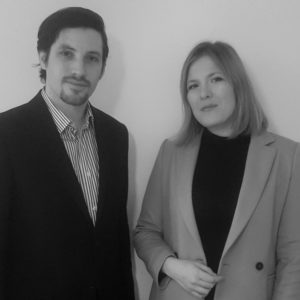

Sébastien Lachaussée & Elisa Martin-Winkel
Starting a French film production company
Starting a production company requires to carefully consider the conditions in which such company will be created. It requires to: select the partners and the legal form of the company, finance the creation of the company and its activities, think of the eventual incompatibilities regarding the French entertainment temporary worker status known as « intermittence ».
Choice of the legal form
After having chosen its partners, the choice of the legal form is crucial. Generally, partners shall chose between a simplified joint-stock company (French « société par action simplifiée » /« SAS ») or limited liability company (French « société à responsabilité limitée »/ « SARL »).
Among the differences between these legal forms we can point out that:
•SARL may have one or more manager, whereas the SAS can only have a single chairman and possibly a general manager, a committee, a board of directors …
•Transfer of shares in SARLs are always subject to approval while for SAS shares it is mandatory only if provided so in the Memorandum of Articles;
•voting conditions for Ordinary and Extraordinary General Meetings are legally determined for SARL but fall under the Memorandum of Articles for SAS.
The choice will depend on the circumstances of the creation and the wishes of the initial partners, their activities and position in and without the company. It is then necessary to study these options by consulting with experienced professionals.
Amount and forms of the capital
As regards the amount and the form of capital, it is important to note that in kind contributions (material, copyright, etc.) must be fully paid up immediately and provided as soon as the shares are subscribed. Moreover, sweat equity are possible, but are not constitutive of the social capital but only result in the allocation of specific shares.
In any event, it is wise to prefer financial contributions, whether paid-up or not, which will allow the financing of the company’s activities.Moreover, it is understood that French law require that a minimum portion of the capital is released at the time of subscription:
•For SARL: 1/5 must be released at subscription, the remainder must be released (in one or several installments) within five years from the company registration to French commercial register;
•For SAS : half must be released at subscription, the remainder must be released (in one or several installments) within five years from the company registration to French commercial register ;
In addition, article 211-3 3° – of the general rules of the financial support of French National Centre of Cinematography notably provides that to benefit from a financial support production company should be set-up as commercial companies with a capital amounting at least to 45 000 € including 22 500 € of financial contribution fully released. Such condition is verified at the time of CNC’s investment approval or production approval.
Therefore, if the amount of a production company capital can be freely chosen and increased progressively, it must at least reach € 45,000, of which € 22,500 are financial contributions to be made at the latest for the application for CNC ‘s production approval and preferably before applying for any funding.
Management of the company and incompatibilities with French « Intermittence »
In France, allowance of an unemployment benefit implies to be in a situation of effective and permanent search for employment. Exercise of a stewardship mandate, even if unpaid, implies a more or less important temporal investment, which may therefore contravene to the condition of active search for a job. To establish if a manager or president is likely to be actively seeking for an employment, French employment agency states that it is necessary to determine whether the company is carrying on an activity or is dormant and if the manager performs positive and repeated acts of job search. (Circulaire Unédic n° 2014-26 du 30 septembre 2014, Annexe 7, p. 110).
Furthermore, if the employment agreement is concluded with the society in which the technician is partner, it is necessary to consult with French employment agency to the possibility to both work under the intermittence regime and exercise a stewardship mandate. It will require transmitting all documents that establish that the employment agreement fullfils the independence requirements regarding the stewardship mandate. A standardized process is provided. Moreover, when applying for job loss allowances, the intermittent employee must inform French employment agency of the existence of his stewardship mandate, which will lead to further examination of the file and a possibility of refusal of such plurality of activities.
Financing of the company’s creation and first activities
Firstly, it should be noted that CNC offers financial support per project, including writing aids, but these can be difficult to obtain for a recent company. Then, it is to be pointed out that CNC offers no assistance pertaining to the creation and development of production companies.
Support for jobseekers creating or taking over a company (ACCRE in French) may be interesting in the context of the creation of a company. ACCRE offers eligible persons an exemption from payroll taxes. Are notably eligible to this scheme, jobseekers that are entitled to allowances, the beneficiaries of the French inclusion income support (RSA) or persons under the age of 26 who create and control a company. It is to be noted that since January 1st 2017, this support is reserved only for persons with revenues under the social security annual threshold (39 228 € in 2017) and is a regressive aid.
It is obviously possible to solicit bank loans. If necessary, it will be advisable to turn to banks specialized in film and audio-visual production (natixis-coficiné, neuflize OBC …). However, they are receptive only to requests from companies with at least one feature film at a late stage of development. It is also interesting for producers to contact IFCIC, a French institution whose mission is to facilitate access to bank financing for companies in the cultural industries.
To finance the development of their activities Producers may request the support of Sofica. Indeed, even if most of Sofica’s investments are made within the context of specific projects, the latter also contribute to the financing of the companies themselves. As an example, in 2016, 24% of the Soficas’ investments were subscriptions of production companies’ share: 81,6% for the development of cinematographic works and 18,4% for audio-visual works. However, it must me pointed out that the interests of the Sofica will be mostly placed on companies they have previously collaborated with for a film production.
SHARE THIS ARTICLE
CONTACT
OUR OFFICES
INFORMATION
sl@avocatl.com
PHONE
+33.1.83.92.11.67
Address
121, boulevard de Sebastopol
75002 Paris
5th floor / Staircase A
Follow us :
Newsletter
Please enter your e-mail :
